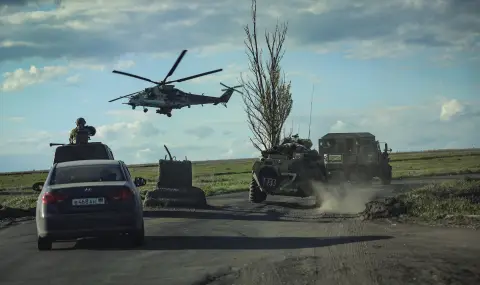Serbian mercenary, who fought months for the Russian army in Ukraine, said that everything in Vladimir Putin's army is one big lie.
"Russia's war in Ukraine is built on lies and death," the Serb told RadioFreeEurope. He is named Dragan, but for obvious reasons his true identity is kept secret.In June 2023, he landed in Belgrade with documents proving that he worked in Russia in a construction company. However, the reality is different. Dragan and many other Serbs are actually being recruited into the Russian armed forces to fight in Putin's war against an independent Ukraine.
Dragan says that he was lucky to receive training from the Russian special forces, but many of his compatriots are sent to the front with almost no training and poorly armed. Dragan was trained for 2 months and then fought at the front for half a year before returning. He provided the journalists with photographic material and other evidence.
Many Serbs (their exact number is not known) go to Russia to supposedly fight for the “fraternal“ you are russian people In reality, however, the lives of Serbs have no value to the Russian military commanders, who send them to certain death and treat them with disrespect.
„Human life is as valuable to them as it was under [Joseph] Stalin,”, Dragan says. “A huge business in which ordinary people are killed – mobilized or paid“, he points out.
Participating in foreign wars has been a crime punishable by up to eight years in prison since Serbia tightened its laws in 2015, and Serbian President Aleksandar Vucic's public warnings against it have become stricter since early 2022. However, his country has avoided joining EU sanctions against Russia and maintains trade and diplomatic ties with Moscow. A survey shows that almost half of Serbia's 7 million inhabitants still consider Russia their main ally.
Dragan had no previous military experience beyond his mandatory six-month conscription, and he told RFE/RL that he had never been involved in nationalist groups or been particularly active politically. But attracted by the prospect of "helping the fraternal Russian people" and the Russian passport that he was promised, but never received, Dragan buys his own plane ticket to the Moscow international airport “Vnukovo“ through Turkey. “Salary and money were not my motive,”, he said.
When asked about the financial terms of the deal, Dragan said he received about $1,215 in cash for each of the two months of training and about twice that for each of the six months he fought in Ukraine. The average monthly salary in Serbia at that time was about 808 dollars.
Dragan said that he was met at Vnukovo airport. from a man who introduced himself as Dima and whom Dragan found out was a Russian military intelligence officer.
The Serbian mercenary says that citizens of Republika Srpska (Bosnia), Montenegro and North Macedonia also fought for the Russian army. Dragan signs a contract, which is not with the Russian army, but with PMC "Redut". However, after Prigozhin's rebellion, Moscow changed its legislation.
Dragan joins the war in January 2023 after two months of training. His unit fought in the battles for Avdeevka and Lisichansk. Dragan said he counted roughly 70 other Serbs throughout his eight-month experience, though he said many were sent into the fray with far less training and completely unprepared for combat. “We are the only ones who had [a full two months of] training,”, Dragan said. “Others had from five to 14 days.“
After six months in Ukraine, in June 2023, Dragan said he was disappointed by what he saw of the Russian military. From his point of view, “business and corruption flourish” and “the Russians – as we Serbs imagine and see them – exist in a very small percentage“.
Before returning to Serbia, Dragan received a document saying he worked for a Moscow-based company called Monte Gradnja, in case Serbian border officials became suspicious. In just half a year, Dragan personally saw the bodies of 15 murdered Serbs.
